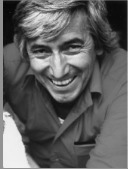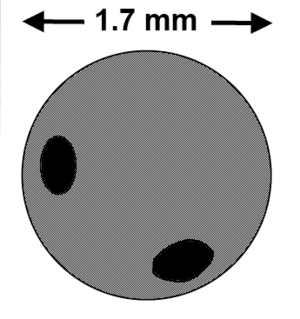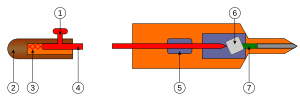Georgi Markov facts for kids
Quick facts for kids
Georgi Markov
|
|
|---|---|
| Георги Иванов Марков | |
 |
|
| Born | 1 March 1929 |
| Died | 11 September 1978 (aged 49) Balham, London, England
|
| Cause of death | Ricin poisoning |
| Occupation | Writer, broadcaster, playwright, anti-communist dissident |
|
Notable work
|
The Truth that Killed |
Georgi Ivanov Markov (born March 1, 1929 – died September 11, 1978) was a famous Bulgarian writer. He was known for speaking out against the government of his home country, Bulgaria. He started his career as a writer of novels, screenplays, and plays.
In 1978, he moved to London. There, he worked as a journalist and broadcaster. He wrote for important news organizations like the BBC World Service and Radio Free Europe. Through his work, Markov openly criticized the Bulgarian government. His strong opinions made him an enemy of the leaders in power.
Sadly, Georgi Markov was killed in London. He was attacked with a tiny pellet that may have contained a deadly poison called ricin. Many people believe the Bulgarian Secret Service, with help from the Soviet KGB, was behind his death.
Contents
Early Life in Bulgaria
Georgi Markov was born on March 1, 1929, in a neighborhood of Sofia, Bulgaria. After finishing high school in 1946, he went to university. He studied industrial chemistry.
Markov first worked as a chemical engineer and a teacher. When he was 19, he became sick with tuberculosis. During his time in hospitals, he started writing.
His first novel, The Night of Caesium, came out in 1957. Soon after, he published another novel, The Ajax Winners (1959). He also released two collections of short stories in 1961.
In 1962, Markov's novel Men won an award. He then became a member of the Union of Bulgarian Writers. This was important for a professional writing career. He also worked for a publishing house.
His story collections, A Portrait of My Double (1966) and The Women of Warsaw (1968), showed his talent. Markov also wrote plays. However, many of them were not allowed to be shown in theaters. This was because the Communist government censored them.
Markov was also one of the writers for a popular TV series called Every Kilometer. This show featured a detective and a resistance fighter. Even though some of his works were banned, Georgi Markov became a successful writer.
Becoming a Writer and Dissident
A "dissident" is someone who strongly disagrees with their government. Georgi Markov became a well-known dissident.
In 1969, Markov traveled to Bologna, Italy, to visit his brother. He planned to return to Bulgaria later. But he changed his mind and decided to stay in the West. This decision was made final when the Bulgarian government refused to renew his passport in 1971.
Markov then moved to London. He learned English and began working for the Bulgarian section of the BBC World Service in 1972. He also worked for other international broadcasters like Deutsche Welle and Radio Free Europe.
Because he left Bulgaria without permission, his membership in the Union of Bulgarian Writers was stopped. He was also sentenced to six and a half years in prison, even though he wasn't there. His books were removed from libraries and bookshops in Bulgaria. The government did not mention his name in the media until 1989.
In London, his play To Crawl Under the Rainbow was performed in 1974. Another play, Archangel Michael, won an award in Edinburgh. Markov married Annabel Dilke in 1975, and they had a daughter, Alexandra-Raina, a year later.
Between 1975 and 1978, Markov wrote his In Absentia Reports. These were weekly broadcasts on Radio Free Europe. In these reports, he openly criticized the Communist government of Bulgaria and its leader, Todor Zhivkov. This made him a major enemy of the government.
After the Communist government ended in Bulgaria, his In Absentia Reports were finally published there in 1990. In 2000, Georgi Markov received a special award from Bulgaria. It was for his important contributions to literature and for standing up against the Communist government.
The Assassination
On September 7, 1978, Georgi Markov was walking in London. He was waiting for a bus near Waterloo Bridge to go to his job at the BBC. Suddenly, he felt a sharp pain in his right thigh, like a bug bite. He looked back and saw a man picking up an umbrella. The man quickly crossed the street and got into a taxi.
When Markov arrived at the BBC offices, he noticed a small red mark where he felt the sting. The pain did not go away. He told his colleagues about the incident. That evening, he got a fever. He was taken to St James' Hospital in Balham. Four days later, on September 11, 1978, Georgi Markov died at age 49.
Investigation and Aftermath
Doctors tried to figure out what made Markov sick. They even thought he might have been bitten by a poisonous snake. An X-ray of his leg didn't show anything. Because Markov suspected he was poisoned, the police ordered a detailed examination of his body.
During the examination, a tiny pellet was found in the tissue sample from his leg. This pellet was very small, about 1.70 millimeters wide. It was made of platinum and iridium. It had two tiny holes drilled through it, forming an X-shape.
Scientists believed the pellet might have contained ricin, a deadly poison. They thought a sugary coating might have covered the holes. This coating would melt at human body temperature, releasing the poison into Markov's bloodstream. At that time, there was no known antidote for ricin.
Just ten days before Markov's death, another Bulgarian defector, Vladimir Kostov, was attacked in a similar way in Paris. He survived.
A former KGB agent, Oleg Kalugin, said that the Bulgarian Secret Service planned Markov's murder. He claimed the Soviet KGB helped them. No one has ever been charged with Markov's murder. This is because many documents about the case are missing or destroyed. Kalugin said an "umbrella gun" was used.
A British newspaper reported that the main suspect was an Italian man named Francesco Gullino. A documentary in 2006 showed that Gullino was still alive and traveling freely in Europe. Police in London renewed their investigation in 2008. Gullino died in Austria in 2021.
In Culture
Georgi Markov's assassination has been mentioned in several books and TV shows:
- It appears in John D. MacDonald's 1979 novel The Green Ripper.
- It is mentioned in an episode of the TV show CSI.
- The assassination is also talked about in the TV series Breaking Bad, in the episode "Seven Thirty-Seven".
- It was mentioned in an episode of The Young Ones called "Demolition".
- In August 2018, the case was the topic of the BBC Radio 4 program The Reunion.
- The assassination is used as a plot idea in the TV series NCIS, in the episode "Obsession".
- It is also mentioned in the Apple TV series Slow Horses, season two, episode one.
Similar Attacks
There have been other attacks that resemble the Markov case:
- In 2012, a German man died almost a year after being stabbed with an umbrella in Hanover. Police found dimethylmercury in the syringe the victim took from the attacker.
- In 2016, police in Chennai, India, solved three murders. The killers confessed to using an umbrella with a syringe filled with potassium cyanide. They rode past their victims on a bike and jabbed them in the thigh.
See also
 In Spanish: Gueorgui Márkov para niños
In Spanish: Gueorgui Márkov para niños
- List of Eastern Bloc defectors
- List of unsolved murders in the United Kingdom
- Incidents involving ricin
- Poisoning of Alexander Litvinenko
- Salisbury poisoning
- List of journalists killed in Europe
- The Executioner (Kisyov novel)
 | Frances Mary Albrier |
 | Whitney Young |
 | Muhammad Ali |



